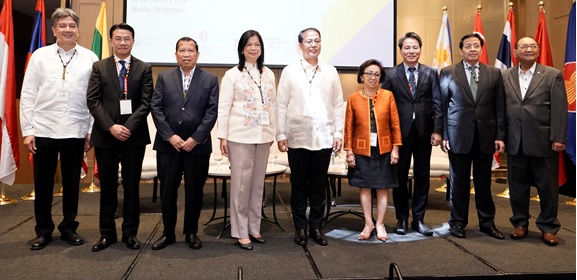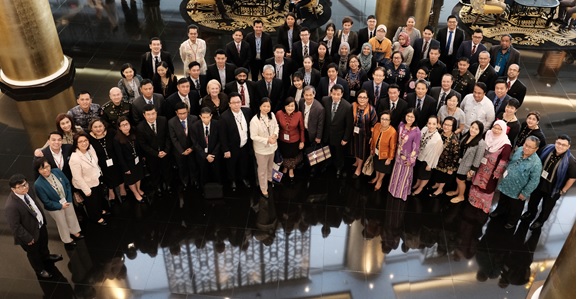
(L-R) Atty. Jaime Hofilena (Ateneo de Manila University), Dr. Darmp Sukontasap (Chair of the AIPR Governing Council), Former Indonesian Minister of Law and Human Rights) Hamid Awaluddin, H.E. Elizabeth P. Buensuceso (Permanent Representative of the Philippines to ASEAN), Secretary Carlito Galvez (Presidential Adviser on Peace, Reconciliation and Unity), Former Philippine Secretary of Foreign Affairs Delia Albert, H.E. Kim Young-Chae (Ambassador of the Republic of Korea to ASEAN), Former Indonesian Minister of Foreign Affairs Hassan Wirajuda, Gen. Eduardo Ermita (Former Philippine Executive Secretary and Former Presidential Adviser on the Peace Process).
The Permanent Mission of the Philippines to ASEAN, the Office of the Presidential Adviser on the Peace Process, and Ateneo de Manila University, under of the auspices of the Jakarta-based ASEAN Institute for Peace and Reconciliation (AIPR), successfully conducted the first leg of the Training Series entitled “Mainstreaming Peace and Reconciliation in ASEAN.” The first leg was held on 21-22 February 2019 in Manila with the theme “Approaches in Peace Processes and Peace Building in Southeast Asia and the Role of Mediators” and was supported by the ASEAN-Korea Cooperation Fund.
Around 80 experts, diplomats, peace practitioners, educators and representatives of civil society from ASEAN Member States gathered to discuss the challenges and best practices in mediation within a peace and reconciliation context. The distinguished roster of resource persons included Former Indonesian Foreign Minister Hassan Wirajuda, who shared his experiences as an international mediator during the peace processes between the Philippines and the Moro National Liberation Front (MNLF); Former Indonesian Minister for Law and Human Rights Hamid Awaluddin, who shared his insights on the Aceh Peace Process; and Former Executive Secretary and Presidential Adviser on the Peace Process General Eduardo Ermita, who was a key figure in the Philippines’ peace efforts.

During the Opening Ceremony, Permanent Representative of the Philippines to ASEAN and co-organizer of the event, Ambassador Elizabeth P. Buensuceso, highlighted that the major inspiration for the Training Series is the fact that “ASEAN is a region fraught with many challenges and there is no shortage of causes for us to wage conflict among each other. And yet, we choose to live in peace and settle our differences in a peaceful way, a most cherished principle enshrined in the ASEAN Charter.”
Ambassador of the Republic of Korea to ASEAN, H.E. Kim Young-Chae, welcomed the partnership with AIPR and the Philippines. He noted that the “peace and reconciliation has been a huge issue in our region in interstate, as well as intercommunity relations,” and underscored that “that peace and reconciliation starts by respecting difference and appreciating commonalities” which is at the heart of the ASEAN spirit.
Ateneo de Manila University Vice President for Social Development and Global Affairs and Corporate Secretary, Atty. Jaime Hofilena welcomed this second opportunity to partner with AIPR, following the successful partnership during the conduct of the Symposium on the Establishment of an ASEAN Women for Peace Registry held in December 2018.
Presidential Adviser on Peace, Reconciliation and Unity Secretary Carlito Galvez, who delivered the Keynote Address, called for ASEAN Member States to “heed the call of peace, reconciliation and unity of our countries.” He continued to say that “we certainly need to put our acts together to mainstream peace and reconciliation in the same way that the women, peace, and security agenda or United Nations Resolution 1325 has led to the mainstreaming of a gender perspective in peace operations.”
The AIPR is mandated to be ASEAN’s primary institution for research activities on peace, conflict management and conflict resolution. The succeeding legs, to be held in Myanmar and Laos, will tackle the topics of Peace Mechanisms: Ceasefire, Security Arrangement in Conflict Areas (2nd leg) and Reintegration Experiences in Southeast Asia: Focus on Transitional Justice, Healing and Reconciliation Modes (3rd leg). END.

